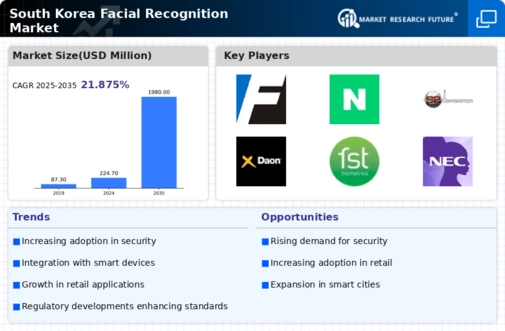South Korea Facial Recognition-Market Summary
The South Korea Facial Recognition market is projected to experience substantial growth from 224.7 million USD in 2024 to 1980 million USD by 2035.
Key Market Trends & Highlights
South Korea Facial Recognition Key Trends and Highlights
- The market is expected to grow at a compound annual growth rate (CAGR) of 21.88% from 2025 to 2035.
- By 2035, the market valuation is anticipated to reach 1980 million USD, indicating a robust expansion.
- In 2024, the market is valued at 224.7 million USD, reflecting the increasing demand for facial recognition technologies.
- Growing adoption of facial recognition technology due to enhanced security needs is a major market driver.
Market Size & Forecast
| 2024 Market Size | 224.7 (USD Million) |
| 2035 Market Size | 1980 (USD Million) |
| CAGR (2025-2035) | 21.88% |
Major Players
FaceFirst, Naver, S1 Corporation, Lotte Data Communication Company, Daon, FST Biometrics, NEC Corporation, Daewoo Engineering and Construction, LG Electronics, Kakao, Samsung Electronics, Hanwha Techwin, Hikvision, IDEMIA, Visionlabs



















